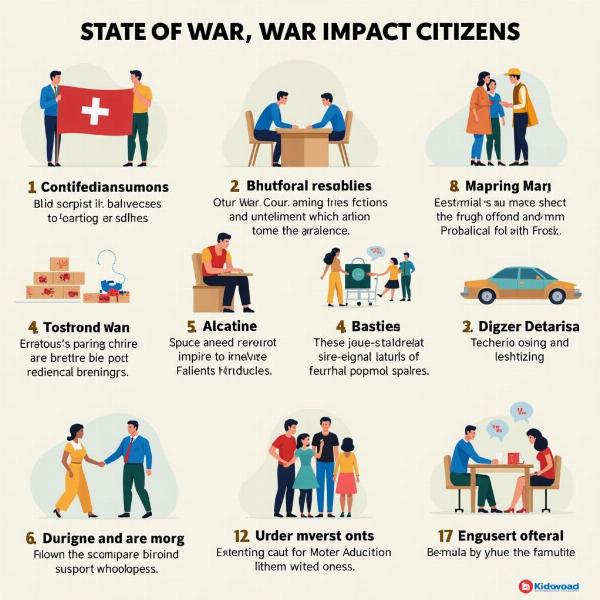Understanding the meaning of “state of war” is crucial, especially in a diverse and politically significant nation like India. While the term might seem straightforward, its implications extend beyond simple armed conflict. This article explores the multifaceted meaning of “state of war” in Hindi, delving into its legal, political, and social ramifications. We will examine its various interpretations, historical context, and relevance in modern India.
Understanding “State of War” (युद्ध की स्थिति)
“State of war” in Hindi is typically translated as “yuddh ki sthiti” (युद्ध की स्थिति). However, this translation doesn’t encompass the full breadth of the term. A state of war doesn’t necessarily mean active fighting is taking place. It can refer to a legally declared state between two or more nations, even without actual battles. This declaration has significant consequences, impacting international relations, trade, and citizen rights. It’s a formal recognition of hostility, empowering governments to take extraordinary measures. Consider the difference between a border skirmish and a full-blown declaration of war – the latter signifies a fundamental shift in the relationship between nations.
Legal and Political Implications of “Yuddh Ki Sthiti”
The legal ramifications of “yuddh ki sthiti” are profound. It allows governments to enact emergency powers, restrict civil liberties, and mobilize resources for defense. In India, the Constitution grants the President the power to declare war and peace. This power, however, is exercised on the advice of the Council of Ministers. A declaration of war significantly impacts international treaties and agreements. It can lead to the severance of diplomatic ties, trade embargoes, and international sanctions.
 Impact of War on Citizens
Impact of War on Citizens
“State of War” vs. “Armed Conflict”
It’s important to distinguish between “state of war” and “armed conflict.” While a state of war often leads to armed conflict, the two aren’t synonymous. Armed conflict can occur without a formal declaration of war, such as in cases of insurgency or terrorism. For example, India has faced numerous armed conflicts without formally declaring war. These conflicts, while devastating, didn’t trigger the full legal and political consequences of a declared “state of war.”
Historical Context of “State of War” in India
India has experienced several periods of “yuddh ki sthiti” throughout its history, most notably during the Indo-Pakistani wars. These periods witnessed significant social and economic upheaval, impacting every facet of Indian life. Understanding this historical context helps us appreciate the gravity of the term and the potential consequences of a future declaration.
“State of War” in Modern India: Challenges and Considerations
In the modern era, the concept of “state of war” has become more complex. The rise of non-state actors, cyber warfare, and asymmetric warfare presents new challenges. India’s strategic position and geopolitical considerations necessitate a nuanced understanding of “yuddh ki sthiti” and its implications in the 21st century.
Conclusion
The term “state of war,” or “yuddh ki sthiti” in Hindi, carries significant legal, political, and social weight. It represents a formal recognition of hostility between nations, potentially leading to armed conflict and widespread disruption. Understanding the nuances of this term is crucial for anyone seeking to comprehend international relations, political discourse, and the potential impact on individuals and nations.
FAQ
- What is the exact Hindi translation of “state of war”? The most common translation is “yuddh ki sthiti” (युद्ध की स्थिति).
- Does “state of war” always mean active fighting? No, a state of war can exist without active fighting. It is a formal declaration of hostility.
- Who has the power to declare war in India? The President of India, on the advice of the Council of Ministers.
- What is the difference between “state of war” and “armed conflict”? Armed conflict can occur without a formal declaration of war, such as in cases of insurgency or terrorism.
- What are the implications of a “state of war”? It can lead to emergency powers, restrictions on civil liberties, mobilization of resources, and severance of diplomatic ties.
don t beat about the bush meaning in hindi
mehfuz meaning in hindi
i want hug meaning in hindi
good mind good find meaning in hindi
Meaning-Hindi.in is your one-stop solution for all your Hindi translation needs. We offer expert translation services in various domains, from business and legal documents to technical manuals and website localization. Our team of experienced translators ensures accurate and culturally sensitive translations, bridging the language gap for businesses and individuals alike. Contact us today at [email protected] or call us at +91 11-4502-7584. Meaning-Hindi.in helps you connect with the world through the power of language.